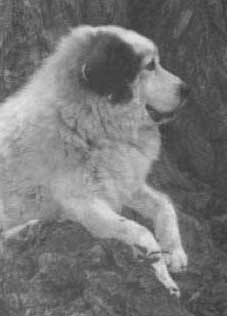(Extracts from the Hanbook of PMDC of GB - Copies available from the Secretary)
Feeding
It is hard to generalise about feeding Pyreneans as, like people, their needs vary tremendously, except to say that young puppies need feeding little but often, while adults may only eat once a day and in amounts that seem exceedingly small for the size of the dog. During the crucial growing period, when for a short time a puppy can gain a pound a day in weight, it is essential that the food intake is of the right amount and the right type. Two distinct options are open to owners, but any change from the regime on the diet sheet supplied by the breeder must be introduced very gradually. These options are mixed feeding or dried complete feeds.
An example of mixed feeding for a puppy taken from the Club's puppy leaflet is:
| 8 a.m. | Milk meal (e.g. Farex, Wheatabix, Porridge or Rice Pudding) | ||
| 12 noon | Meat Meal (e.g. Fresh Meat, Pedigree Chum puppy food mixed with puppy meal) | ||
| 4 p.m. | Milk Meal (as above) | ||
| 8 p.m. | Meat Meal (as above) |
Bonio type biscuits are readily acceptable to Pyreneans between meals and during training. As a puppy reaches four to six months, it's interest in milk meals usually wanes and water becomes the only liquid intake and throughout the dog's life a clean, plentiful supply must always be available. An alternative to fresh meat might be tinned or frozen meat, with fish as a readily acceptable substitute.
 The dried food
alternative to the above is to feed a proprietary brand
of complete puppy food changing to the adult variety as
necessary. These are many and varied and must be used in
accordance with the manufacturer's instructions.
The dried food
alternative to the above is to feed a proprietary brand
of complete puppy food changing to the adult variety as
necessary. These are many and varied and must be used in
accordance with the manufacturer's instructions.
It is not unusual in these days of commercialisation for vets to advise dog owners that despite all the advice given by the dog's breeder that what you should really feed your puppy is the type of food that the vet just happens to sell himself. DO NO be persuaded into this; your puppy's breeder is the one whose advice you should take. It is a different matter if the dog has been ill and is recuperating, as it may be necessary to feed a specialist diet only available through veterinary surgeries.
Avoid bones of any sort as small ones can splinter and become stuck in the throat, while the larger marrow bones tend to stain the front legs and encourage digging.
The Pyrenean skeleton develops very quickly and so extra calcium, but not in excessive amounts, can be given to puppies as can mineral and vitamin additives such as Canovel and SA37.
It is not unusual for a Pyrenean not to want to eat at all, on some days if the weather is particularly hot and even in normal temperatures if the same diet is fed every day the dog might sometimes become bored and refuse to eat. Try feeding in the cool of the evening and mix in a little grated cheese or scrambled egg. But remember if you change to something else to encourage eating then next time he fancies a change, he will know what to do.
Although puppies need as much food as they will eat readily, care must be taken that they don't become too fat, although this is extremely unlikely in the first six months as long as a properly balanced diet is used.